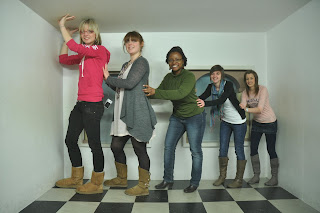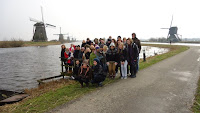Personal Blog
19th – 26th February
Amongst many of the reasons why I’ve decided to take part on the Erasmus programme and leave home to study in another country for a semester is to develop as an individual and learn more about myself. This I can say already has most definitely been the case.
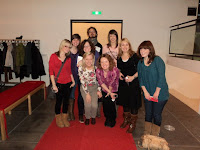 Our classes here uphold a very relaxed and open atmosphere. Most of the learning we do is through group work or discussions and personally I feel I am more confident in contributing to these discussions with independence of thought and personal opinion more so than I would at home. In thinking about this it puzzles me; I questioned whether it was because I don’t know the people on the same level as I know many of the people in my class back in Stranmillis or because the atmosphere and environment fostered is more inviting and respectful of one’s opinion. In any case from these experiences and others contribution, our discussions have been very engaging and interesting. I can say I have learned a lot and been stimulated to question and deepen my thinking.
Our classes here uphold a very relaxed and open atmosphere. Most of the learning we do is through group work or discussions and personally I feel I am more confident in contributing to these discussions with independence of thought and personal opinion more so than I would at home. In thinking about this it puzzles me; I questioned whether it was because I don’t know the people on the same level as I know many of the people in my class back in Stranmillis or because the atmosphere and environment fostered is more inviting and respectful of one’s opinion. In any case from these experiences and others contribution, our discussions have been very engaging and interesting. I can say I have learned a lot and been stimulated to question and deepen my thinking.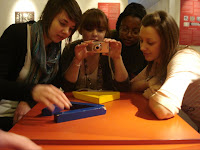 With this in mind we also had a class on ‘Learning about Learning’. It was taken by one of our teachers who is an educational psychologist and has conducted a lot or research in this area especially with student teachers. According to her theory there are five ways in which we learn as student teachers. Inactive/survival, closed reproduction, open reproduction, dependant meaning or independent meaning (Oosterheert 2003). I was able to conclude that at present I see myself in the third stage. I am able to process theory when it is provided but I do not seek it out, ‘keep’ or ‘forget’ attitude and learning is predominantly on the surface, not asking ‘why’. The ideal stage is Stage 5, one where we have a deep independent use of sources, critically process, perceiving our current practice as a continuous ‘research area’ as well as being aware of limitations in our own intuitive knowledge. In any case these stages are not static for the individual and one could progress to becoming independent meaning orientated as they develop as an individual which is a very achievable goal.
With this in mind we also had a class on ‘Learning about Learning’. It was taken by one of our teachers who is an educational psychologist and has conducted a lot or research in this area especially with student teachers. According to her theory there are five ways in which we learn as student teachers. Inactive/survival, closed reproduction, open reproduction, dependant meaning or independent meaning (Oosterheert 2003). I was able to conclude that at present I see myself in the third stage. I am able to process theory when it is provided but I do not seek it out, ‘keep’ or ‘forget’ attitude and learning is predominantly on the surface, not asking ‘why’. The ideal stage is Stage 5, one where we have a deep independent use of sources, critically process, perceiving our current practice as a continuous ‘research area’ as well as being aware of limitations in our own intuitive knowledge. In any case these stages are not static for the individual and one could progress to becoming independent meaning orientated as they develop as an individual which is a very achievable goal. 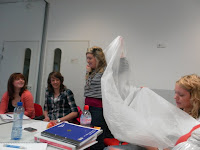 We’ve also been taking a Dutch language course since we arrived in The Netherlands. I must admit this has not been the easiest, I never thought learning a language could be so difficult. The approach the teacher has adopted to teaching the language is obviously contrary to my learning style as it has been highly unsuccessful so far! Rather than starting with the usual vocabulary and useful phrases, we dived right with the grammar. I am determined not to leave without some Dutch so I shall persevere on with the help of Google and its wonderful translators and hopefully I’ll be able to master some.
We’ve also been taking a Dutch language course since we arrived in The Netherlands. I must admit this has not been the easiest, I never thought learning a language could be so difficult. The approach the teacher has adopted to teaching the language is obviously contrary to my learning style as it has been highly unsuccessful so far! Rather than starting with the usual vocabulary and useful phrases, we dived right with the grammar. I am determined not to leave without some Dutch so I shall persevere on with the help of Google and its wonderful translators and hopefully I’ll be able to master some. This failed attempt so far made me consider and empathise with many learners in today’s classrooms. Reflecting on my school practice in both 1st and 2nd year I questioned whether I had provided sufficient provision for all the types of learners within the classroom as well as building on what they already knew in order that each individual would be able to succeed in what they were doing. (Gardner’s theory of Multiple Intelligences and Piaget’s Constructivism) Given this experience I am confident that it has impacted my thinking and in turn I will put much more careful thought into all aspects of planning lessons.
So I can assuredly say this has been a personal learning experience so far, one which I hope will impact me in many ways when I return home.
Kathryn
